|

| |
DAVID W. McCLUNG
was born Dec. 18, 1831, in Seneca County, Ohio. He was
reared on a farm; attended country schools, which were very
good in their day. The residence of the family
bordered on the Western Reserve. He attended school at
the Seneca county academy at Republic, then taught by
Thomas W. Harvey, afterward State School Commissioner.
In this institution he prepared for college and entered
Muskingum college, New Concord, as a freshman in 1850, where
he remained one term; then he entered Miami university, from
which he graduated in 1854. During his preparatory
course he maintained himself by teaching. After
graduation he resumed his chosen profession, as teacher, but
in a higher field. He was first elected principal of
our High school, then Superintendent and Principal of the
schools, serving from September 1854 until June 1857.
In December 1857 he was associated with Colonel Minor
Millikin in conducting and editing the Hamilton
Intelligencer, the Republican organ of Butler county.
He retired from the paper July 29, 1858, to continue the
study of law, and in the winter of 1860, he was appointed by
Governor Dennison, Probate Judge of Butler county,
vice William R. Kinder, deceased. At the
outbreak of the Civil War, Mr. McClung enlisted as a
private in Company F, Third Ohio Infantry, and was sworn
into service on April 24. On the 27th of the same
month he was detailed from the ranks and made quartermaster
of Camp Dennison with the rank of captain. He remained
in camp until June 16, 1862, when he was ordered to Camp
Chase, Columbus, to erect the rebel prison pens.
Captain McClung's money accounts with the government
during the war aggregated $25,000,000; his property
accounts, about $60,000,000. He was honorably mustered
out of the service at his own request, Nov. 8, 1865.
Prior to this he was brevetted major of volunteers upon the
recommendation of General Ekin, for valuable services
rendered to his country. In 1866 Major McClung
returned to Hamilton and was elected president of the Second
National bank. He resigned this position after serving
eighteen months and embarked in the manufactory of
wood-working machinery. Afterward he was
superintendent and business manager of the Woodsdale Paper
Co. In 1879, he removed to Cincinnati and was
appointed Assistant Postmaster, and in 1881 became Surveyor
of the Port of Cincinnati, serving continuously until 1885.
Major McClung was appointed, by President Harrison
in 1889, Collector of Internal Revenue for the Third
District of Ohio, serving until Dec. 1, 1893. He has
been twice appointed trustee of his Alma Mater, Miami
university. On the question of national finances he is
well informed, being a ready and fluent debater on the
subject. He is an able and enthusiastic worker in the
cause of Republicanism. On Mar. 19, 1861, Major
McClung was united in marriage to Miss Anna Carter
Harrison, granddaughter of General William Henry
Harrison.
Source: Biographical & Historical Sketches - A
Narrative of Hamilton and Its Residents from 1792 to 1896 -
Publ. 1896 - Page 105 |
| |
JOHN McKEE
- Was born
in Kentucky, February 20, 1829. His parents
emigrated to Butler county in 1844. He was married
to Sarah J. Beckett, daughter of Mr.
Robert Beckett, September 24, 1861. Three
children were born from this union.
Mr. McKee was reared on a farm, but taught
school for a period of six years, before entering the
army. He graduated from Williams college in 1855.
At the breaking out of the Civil War Mr.
McKee was commissioned captain of Company K,
Thirty-seventh Indiana volunteers. He was severely
wounded at the battle of Stone River, December 31, 1862,
and was sent home on a furlough. Afterward, being
unfit for active duty, he resigned, having served his
country well for two years. Capt. McKee
refused to accept pay from the time he was wounded until
his resignation was accepted, claiming that he was not
entitled to it, having rendered no actual service during
the time.
Capt. McKee was appointed Postmaster
September 8, 1873, and served for eight years. At
the time he was commissioned,
he was drawing a pension, and immediately asked for the
cancellation of his certificate and turned the money
that had accrued on same into the United States
treasury. Here we have a true illustration of
John McKee's
character, moral excellence and conscientiousness.
John E. Heiser was Capt.
McKee's able assistant, and rendered the community
valuable service.
Source: Biographical & Historical Sketches - A
Narrative of Hamilton and Its Residents from 1792 to
1896 - Publ. 1896 - Page 125 |
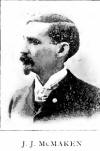
J. J. McMaken |
|
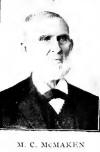
M. C. McMaken |
|
| |
M. N.
MAGINNIS was born near Frederick City Maryland.
He received a liberal education in Eastern colleges, and
came West. He studied law with Governor John W. Stevenson,
of Kentucky, and Judge James Clark, of
Hamilton. He was admitted to the Butler county bar in
1861, and was actively engaged in the profession for ten
years.
He was a disciple of John C. Calhoun, and ably
defended nullification. He was noted for the courage and
ability with which he expressed his convictions.
On August 3, 1861, the Democratic party held a
convention in the court house. The Civil War had many
opponents in Butler county. Mr. Maginnis
was the leader of this convention. He introduced the
following resolutions, which we take from the Telegraph,
of August 8, 1861:
WHEREAS, the "Bill of Rights" of Ohio affirms
that "all political power" (or sovereignty) "is inherent in
the people" of each state respectively; and that they have
the right to alter, reform or abolish their government
whenever they may deem it necessary"; and
WHEREAS,
"Governments are instituted among men deriving their just
powers from the consent of the governed;" and Whereas, the
coercion of a state to endure a form of government obnoxious
to its people unsettles the whole theory of the independence
of the "United States of America;" and Whereas, the people
of eleven States have refused to acknowledge the authority
of the Constitution, or permit the execution of laws made in
pursuance thereof within their boundaries, having
deliberately revoked the delegated powers heretofore
exercised by their trustee, the United States Government;
and
WHEREAS, an immense army has been raised for the avowed
purpose of compelling the people of several States to
recognize the Constitution of the United States as their
supreme law and irrevocable act; and
WHEREAS, by the act of the president of the United
States, instigated thereto by the irrepressible fanatics, a
furious internecine war exists, which has aroused every
latent animosity, and which promises to increase and
intensify every prejudice in the minds of the people of the
contending states;
and
WHEREAS, the Democracy of the state of Ohio are called
upon to make preparation to resume the reins of government
which the bastard "Phaetons" of Abolitionism have so
unskillfully handled, and to endeavor to restore peace to
their distracted country, therefore:
Resolved, 1. That the Democracy of Butler County
in Convention assembled, declared as the result of their
deliberate judgment, that a war for forcing upon the
sovereign people of a State, even the best form of
government, is neither wise, just, Constitutional, nor
practicable; that we solemnly protest against its further
continuance for so fatuous a purpose, demand a Peaceable
adjustment of all controversy existing between the United
and Confederate States, and insist upon the immediate
appointment of Commissioners
by our own Government to hear and report such proposals on
amity as the Commissioners of the Confederated States may be
instructed to offer.
Resolved, 2. That the president of the United
States in exercising the executive, legislative, and
judicial powers of the government, by declaring war, raising
armies, providing navies, establishing blockades, expending
money without appropriation by law, suspending the privilege
of the writ of habeas corpus; proclaiming martial law,
increasing the regular army and navy, and by authorizing
subaltern military officers to prescribe special regulations
for the military service, imprison citizens at their
discretion, and disregard the mandate of a co-ordinate
branch of the government, has seriously jeopardized the
rights of these states; has flagitiously violated the
constitution; has made his will and not that instrument, the
measure of power, has invoked the condemnation of every
patriot, and deserves impeachment, for his high crimes and
misdemeanors.
Resolved, 3. That the incapacity of the party
which has clambered to power over the fragments of a nation
is made glaringly apparent, when the Republican Congress has
no rebuke to offer for its violated privilages, when
it fails to perform its Constitutional duty, in calling the
culpable Executive to a rigid account, when with eager
sycophancy it votes one-fourth more men and money than the
President demanded, or the emergency required, and when with
unequalled folly it attempts to patch a broken Constitution
with such worthless rags as retroactive laws.
* * * * *
Resolved, 4. That treason against the United
States consists only of overt acts of levying war against
the same, or in adhering to the enemies, giving them aid and
comfort, that "every citizen may freely speak, write and
publish his sentiments on all subjects;" and that no one can
be justly stigmatized as a traitor for the honest exercise
of that privilege.
A minority report was submitted by Judge James Clark.
It was moved to adopt the majority report. The motion
was vigorously assailed by the leaders of the minority,
Thomas Millikin and Robert Christy,
and ably defended by M. N. Maginnis, author of the
preamble and resolutions, and Hon. Christopher
Hughes. The motion to adopt the majority report
prevailed.
The convention adjourned with three cheers for "Vallandingham
and Maginnis.''
Dr. John P. P. Peck, one of the editors of the
Telegraph, refused to publish the Maginnis "Bastard
Phaeton" resolutions and the True Telegraph was established,
which name was afterward changed to the Butler County
Democrat.
At the October election in 1861, the larger portion of
the Democratic county ticket was defeated, owing to the
adoption of the Maginnis resolutions.
In 1876 he examined the commissioners detailed
statement, and severely criticised the board for
careless, extravagant and unlawful expenditures.
In 1871 he was elected Mayor. Hamilton had been
for a long time terrorized by the criminal classes and the
people of the city without distinction of party, elevated
him to the Mayorality. He was re-elected in 1875, and
during his second term, procured the passage of an act by
the legislature, establishing a police force in Hamilton.
He thorough^ suppressed crime and lawlessness during his
administrations. He is now located in San Francisco,
California.
Source: Biographical & Historical Sketches - A
Narrative of Hamilton and Its Residents from 1792 to 1896 -
Publ. 1896 - Page 135 |
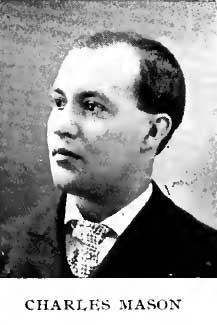
Charles Mason |
CHARLES MASON Source:
Biographical & Historical Sketches - A Narrative of Hamilton
and Its Residents from 1792 to 1896 - Publ. 1896 - Page
_____
Portrait between pps. 168 & 169 |
| |
JACOB
MATTHIAS was born October 21, 1802, at Winchester,
Virginia. While young he learned the trade of a
coppersmith and in the fall of 1827 emigrated to Cincinnati,
remaining there a year. He was married March 27, 1820,
to Emily W. Grooms. Eight children resulted
from this union. When he first came to Ohio he made a
journey to Rossville on foot, returning in the same manner.
He and his brother Isaac came to Rossville in
1828 and organized the firm of I. and J. Matthias,
engaging in the coppersmith business, later adding the stove
and tinware trade.
Jacob Matthias was a member of the firm
of Matthias, Kline & Resor, conducting
a general store in Rossville.
Mrs. Matthias died in 1845, and on April
23, he married Ann M. James, daughter of Barton
James, one of the pioneers of Hanover township, where
he settled in 1817. Jacob Matthias was
in the state legislature in 1837- 1838; was a member of City
Council, School Board and also an Infirmary Director.
He was an influential citizen and a consistent member of the
Universalist church. He died August 21, 1877, at New
Paris, Preble county.
Source: Biographical & Historical Sketches - A
Narrative of Hamilton and Its Residents from 1792 to 1896 -
Publ. 1896 - Page 130 |
| |
CHARLES
C. MILLER was born in Baltimore, Fairfield county,
Ohio, November 26, 1856. He attended the schools of his
native village, and in 1872 received his first common school
certificate and began teaching. In 1876 he was graduated
from the Fairfield Union Academy. Subsequently he was
elected superintendent of these schools. In the spring
of 1877, he entered the Ohio State University, of Columbus,
Ohio, and graduated in 1883, with the degree of B. A.
While a student in this university he taught Latin and
Greek. He was Superintendent of the public schools at
Eaton, in 1884-85; was Superintendent of the Ottawa schools
in 1886, and of Sandusky city in 1890. In 1889 he was a
candidate for State School Commissioner, and in June, 1891,
on the death of Hon. John Hancock, the
incumbent, he was appointed by Gov. Campbell
to serve out the unexpired term, ending July 1892. In
March, 1892, he was unanimously elected Superintendent of
the Hamilton public schools, at a salary of $2,700.
Mr. Miller is a man of pleasing address
and very popular among teachers. He makes friends
readily and retains them. In point of scholarship and
as an instructor, educator and enthusiastic worker in the
cause of higher education, he perhaps has no peer in the
state. Because of his eminent success he is popular
with the teachers in every county in the state and the
demand on his time is so great from different counties to
attend Teachers' Institutes that he finds it impossible to
spend more than a half day or so at each.
Source: Biographical & Historical Sketches - A
Narrative of Hamilton and Its Residents from 1792 to 1896 -
Publ. 1896 - Page 116 |
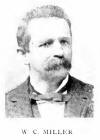
W. C. Miller |
DR.
WILLIAM C. MILLER was born in
Wurtemburg, Germany, in 1854. When he arrived at
the age of seven years, his parents came to America and
located in Hamilton. Dr. Miller was
educated in the public schools of this city. In
1863, he began clerking in a drug store. He was a
close student and advanced rapidy. From a
clerkship he became a proprietor, and with business
success his aspiration to the higher field of medicine
grew aspace. In 1874, he entered Miami Medical
college, at Cincinnati, where he continued until his
graduation three years later. Dr. Miller
followed his profession for some time in Dayton, Ohio,
and that city offered him many advantages, but the fact
of his family's home being in this city determined his
lot in favor of Hamilton, as a permanent location.
He returned to his old home in 1879, and at once
purchased the Barton S. James drug store at the
corner of Main and B streets. His business has
grown as well as his professional work, until it is at
present one of the best established institutions in
Hamilton. He is a man of rare professional skill
and his management is as popular as it is careful and
reliable. Dr. Miller is an accomplished,
intelligent, and trustworthy pharmaceutist. He has
built up a rare and choice library, which is a great
comfort to him. Dr. Miller has been twice
married. First, in 1880, to Erin A. Corwin,
daughter of Jesse Corwin, a prominent member of
the Butler county bar in early days and a brother to the
famous Tom Corwin. Three children resulted
from this union, namely, William, Jesse Blaine
and Warren Martin. The second time he was
united in marriage with Miss Mary Hunter, Sept.
1, 1896. Socially, Dr. Miller is a member
of the Masonic fraternity; in religion, a United
Presbyterian and in politics, a Republican.
Source: Biographical & Historical Sketches - A
Narrative of Hamilton and Its Residents from 1792 to
1896 - Publ. 1896 - Pages
381-382 |
| |
DR.
ROBERT B. MILLIKIN, was born, on December 9, 1793.
At the time of the exodus of his three brothers from their
home in Washington county, Pennsylvania, in 1807, he was
only in his fourteenth year. He remained with his parents
till the spring of 1813, when the spirit of emigration got
the mastery, and constrained him to follow the examples of
his brothers. Upon his arrival in Hamilton he became a
member of his brother's family, where he resided until his
marriage.
A short time after his arrival in Rossville, he began
to study such branches of education as would fit him for the
practice of medicine. The facilities for acquiring a
good education were very few. He availed himself of
such as existed and, after a year's time, began the study of
medicine. The year of 1817 was full of interesting
events for Robert B. Millikin. He was licensed
to practice his profession, likewise he had taken unto
himself a wife, commenced housekeeping and opened an office.
Dr. Millikin was married December 16,
1816, to Sarah Gray, who was related to many
pioneer families. They had three children. Samuel
Millikin, the first son, was born in 1817. Thomas
Millikin, a noted lawyer of this city, was born
September 28, 1819. He married Mary VanHook.
Elizabeth Millikin married William A.
Elliott, son of Arthur W. Elliott, who died in
1881.
After Dr. Robert B. Millikin began the practice
of medicine he devoted himself earnestly to his work.
After many years practice, strict attention to all his
interests and the acquisition of property gave him a
comparatively independent position. He conducted a
drug store in Rossville, now the
First ward of Hamilton. He was general of militia, a
trustee of Miami university and a member of the legislature
of Ohio.
He was appointed Treasurer of the county to fill the
vacancy in that office caused by the defalcation of an
ex-treasurer. Dr. Millikin died June 28,
1860.
Source: Biographical & Historical Sketches - A
Narrative of Hamilton and Its Residents from 1792 to 1896 -
Publ. 1896 - Page 129 |
| |
SAMUEL
MILLIKIN was born in 1817. He received his
education in the private schools of Hamilton and Rossville.
At the age of 25 years he married Miss Mary Halsted.
Three children resulted from this union; Miss Helen
married Charles M. Miller and Miss Lizzie
married a man by the name of Raynor. Both of his
daughters, with their husbands, reside in Chicago. William
H. Millikin, his only son, resides on South Eighth
street in this city. For years Samuel Millikin,
from his quarry at the south end of C street, furnished all
the building stone used in Hamilton and Rossville. He
was appointed Postmaster in 1839. At the breaking out
of the late Civil War, he enlisted in Company A, 26th O. V.
I. and served until the close of the war. He had a
good record as a soldier. After his return from the
scenes of carnage, he immigrated to Missouri, and settled on
a farm about seventy miles west of St. Joseph. He was
Postmaster from May 1, 1844, until May 29, 1849. He
died in 1895.
Source: Biographical & Historical Sketches - A
Narrative of Hamilton and Its Residents from 1792 to 1896 -
Publ. 1896 - Page 131 |
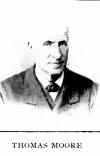
Thomas Moore |
|
NOTES:
|
![]()
![]()
![]()
![]()